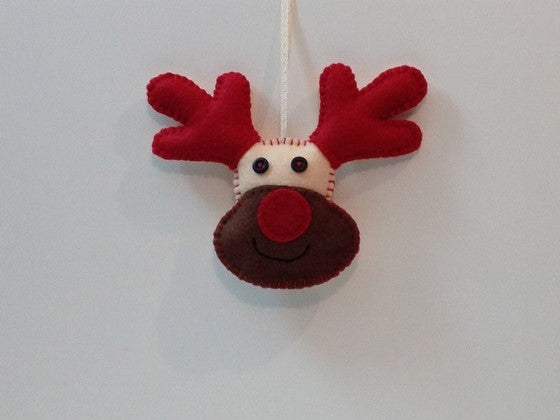Description
Decorate your house this Christmas with everyone’s favourite reindeer: the one with that famous red nose! Make his nose glow even brighter by using a PCB LED that sits under the fabric and lights up when you hold the push switch hidden in his cheek.
The decoration is made out of felt fabric and is lightly stuffed to give a 3D effect. It uses embroidery stitches to decorate the surface and to join the edges. The Reindeer Decoration also comes with a small ribbon from which it can be hung.
The cell holder can be easily accessed via a hole in the chin area, held closed by a small popper. As the decoration is made from scratch, it does require some knowledge of basic textiles skills as well as a basic understanding of how to create a circuit.
Learn how to:
- Create an E-Textiles project from scratch.
- Use a PCB LED.
- Add a push switch to a circuit.
Level of difficulty:
- Intermediate (assumes basic textiles knowledge e.g. fabric cutting, embroidery stitches, popper as well as a basic understanding of how to make a circuit).
Parts list:
In order to create your Rudolph Decoration you will need:
- Push switch.
- White PCB LED.
- Standard holder and cell.
- Conductive thread.
- Felt fabric – 17cm square for each front and back colour, 11cm x 22cm for antlers and nose, 11cm square for snout (approximate measurements).
- Ordinary sewing thread.
- Embroidery thread in colours to match the felt fabric (stranded embroidery thread has been used here and it has been divided in half using 3 strands to stitch with).
- 2 buttons.
- Small popper.
- 20cm ribbon (approximate).
- Stuffing.
You will also need the following equipment:
- Large eye e-textile needle.
- Paper pattern template (see download at bottom).
Step-by-step guide to making a Rudolph light-up Christmas decoration.
Step 1
Pin paper pattern pieces to fabric and cut out.
Use small scissors to cut out the squares in the centre of the snout and front face pattern pieces.

Stitch the red nose onto the snout in the area indicated on the paper pattern.
Although we’ve used blanket stitches in this image, you could use other embroidery stitches or it could be sewn together using a sewing machine.

Stitch the mouth using a back stitch.

Stitch down the snout area to the front fabric along the top of the snout only.

Stitch the buttons in place to create eyes.

Stitch down the antlers to the front fabric along the short bottom edge only.
Step 2

Using conductive thread, oversew the negative side of the LED to the back of the fabric whilst positioning it over the holes under the nose.
Make sure that the LED is facing towards the fabric so that the light will shine through the material.
a href=”https://resources.kitronik.co.uk/images/blogs/2014/01/rudolph_interactive_light_up_christmas_decoration_800_13.jpg” rel=”ig_lightbox2″>
Stitch small running stitches to get to the negative side of the cell holder and oversew into place.
Note, either of the negative connection points on the cell holder can be used. The one that is not used can be sewn down using ordinary thread to make it more stable if required.

Using a new piece of conductive thread, oversew the positive side of the LED onto the fabric. Then stitch small running stitches to get to the position of the push switch and oversew one side into position.
It doesn’t matter which way round the push switch goes.
Step 3

Using a new piece of conductive thread, oversew the remaining side of the push switch. Use running stitches to get to the positive side of the cell holder and oversew in place.
Note, it doesn’t matter which positive connection point on the cell holder is used. The one that is not used can be sewn down using ordinary thread to make it more stable if required. Slide the cell into position to check that the circuit works.
Step 4

Lay the front and back pieces on top of each other with the wrong sides facing. Fold the ribbon in half and trap it between the two layers of fabric in between the antlers.
Trim the edges so that they match up exactly.

Stitch the layers of fabric together around the antlers.

Stuff the antlers using something thin and pointy to get into the corners.

Stitch around the remaining edges, leaving a gap around the chin area. Along this edge, only stitch the snout fabric to the backing layer. This will make it look like the stitching continues all the way around the face.

Stuff the rest of the face, leaving it unpadded around the bottom of the chin.
Check that the stuffing isn’t placing pressure on the push switch, as this will turn the switch on.
Attach a small popper to the opening in order to hold it closed.
Make sure that your stitches don’t come through to the right side of the fabric especially on the back, as this is only a single layer.
Download a pdf version of this page here. ![]()
Download the cutting pattern here. ![]()
This tutorial was produced for Kitronik by Julie Boyd who is a specialist in E-Textiles design.







